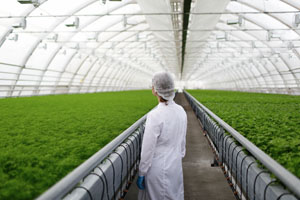A Farmer’s Plea for Certifier Transparency
[This article was previously published in the spring issue of The Cultivator, Cornucopia’s quarterly newsletter.]
 |
Neal Laferriere, owner of Blackberry Botanicals, walks his organic farm in rural West Virginia. When Laferriere walks, he thinks.
As he strolls along the rolling hills, he thinks about his family, their farm, and their future. And, more days than he’d like to, he thinks about his farm’s organic certifier.
As agents of the USDA’s National Organic Program (NOP), certifiers occupy one of the most important roles in the organic movement. Farmers, processors, and handlers hire certifiers to ensure their practices comply with federal organic regulations.
When Laferriere received a letter from his certifier, Pennsylvania Certified Organic (PCO), saying they weren’t going to respond to a survey sent by Cornucopia asking about the types of operations they certify, he started walking.
The survey was sent as part of a comprehensive research project Cornucopia launched to help producers choose certifiers with values that align with their own, and to help educate consumers about the entities that certify the organic products they purchase.
Congress charged the USDA with establishing standards and making sure they were universally applied. But, unfortunately, the NOP has been allowing certifiers to interpret the law on their own, which has resulted in varying applications of the organic regulations.
“Why didn’t my certifier just respond to the survey? What don’t they want me to know?” asked Laferriere.
He has since learned several certifiers sent a similar letter to their clients as a coordinated effort to “circle the wagons,” ignoring and/or attempting to discredit the project.
“Subversion tactics aren’t going to work,” says Laferriere. “Farmers want answers. Certifiers are the gatekeepers to organic production. We want to know who and what they’re letting through the door.”
Like many organic farmers, Laferriere believes in an organic community built on shared values and transparency. Inconsistencies in the way certifiers implement organic regulations and the cloak of secrecy surrounding their certification practices concern him.
Take hydroponics, for example. Some certifiers are certifying massive hydroponic operations run by multinational corporations operating gargantuan greenhouses instead of growing plants in rich, organically managed soil.
To make matters worse, many of the fruits and vegetables that are produced hydroponically are imported from countries that don’t allow the sale of hydroponic produce labeled as “organic” within their own borders.
Some of the largest certifiers are allowing hydroponically produced imports, even though federal law requires soil stewardship as a prerequisite for certification.
A number of certifiers also allow egg producers to substitute small screened porches, often times holding less than 3% of the birds in a henhouse, in place of legitimate outdoor access for their birds.
In organic dairy production, some certifiers consider operations with thousands of cows on exceedingly small acreages and milking 3-4 times a day compliant with grazing requirements.
Certifiers will also certify industrial-scale dairies that buy conventionally raised replacement heifers, sometimes raised with antibiotics, and “convert” them to organic on an ongoing basis.
Why would organic farmers who are committed to growing fruits and vegetables in the soil, as the law intends, pay a certifier that also certifies massive hydroponic operations with whom they are unfairly competing?
Why would organic farmers who are committed to providing their hens and livestock ample outdoor access and grazing time hire a certifier that also certifies industrial-scale operations that look more conventional than organic?
“They shouldn’t,” says Laferriere. “It’s self-defeating, but you’ve got to know the facts to make an educated choice. If a certifier won’t tell you the facts, somebody better ask why.”
Because some certifiers are intent on securing profits generated from the industrial-scale clients, they will endorse the production practices that keep their clients in business.
An inherent conflict of interest is built into a system where certifiers are paid by the operations they are responsible for monitoring. Transparency, however, can help minimize conflicts and an unfettered pursuit of profit.
Certifiers that responded to Cornucopia’s survey did so at the risk of falling into disfavor with members of their trade association and the NOP. In choosing to respond, some of the best certifiers showed a commitment to transparency by refusing to perpetuate the distrust that silence engenders.
Cornucopia’s tiered scoring system reserved the highest rating for exemplary certifiers with a demonstrated commitment to organic principles, transparency, and regulatory adherence.
Certifiers that certify dairy CAFOs of questionable legality (e.g., confinement chicken houses with porches and hydroponics) and/or have been implicated in other improprieties, like certifying products with non-organic ingredients, are relegated to the lowest tier.
Laferriere says he plans to consult Cornucopia’s report to learn more about certifiers, including the identities of the certifiers that didn’t respond to the survey.
“You know, saying nothing actually says a lot about what they don’t want to disclose. But, the fact that some certifiers refused to be silenced gives farmers a meaningful choice and gives me greater confidence in the organic system.”

